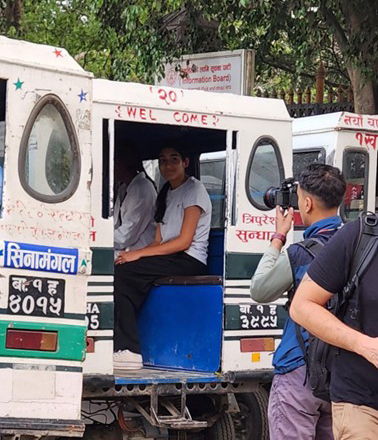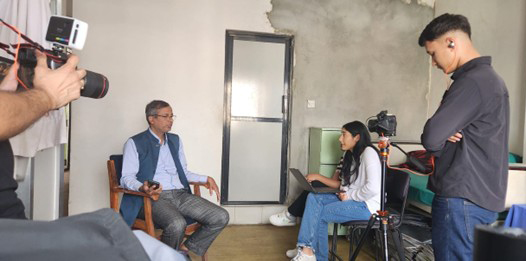The Right to Ride: A Teen’s Mission to Make Transit Safer for Everyone
10/30/2025

Anya Kothari has not yet graduated high school, but she has already worked at a major research institute, traveled abroad to document public transit challenges, and combined these insights into a robust plan for her future and actionable steps toward making a difference.
Like other Gen Z teens, Anya has grown familiar with the increasing urgency of the problem of climate change, but she more recently connected it with the transportation sector. “You hear about it everywhere,” she says, “and it’s easy to see the negative impacts up close here in California with the wildfires every year. Still, it wasn’t until I read a book about the damage being done and how long we have known about it that something clicked for me about how critical this issue is and about how, more and more, there is no going back.”
Anya spoke recently with staff from the Mineta Transportation Institute (MTI), where she interned the past two summers with Dr. Asha Weinstein Agrawal, director of MTI’s National Transportation Finance Center and MTI education director. Starting her research in high school and learning that transportation is the largest contributor to climate-warming greenhouse gas emissions led her to pursue work opportunities in the industry.
Under the guidance of Dr. Agrawal, Anya first gained research experience in the summer of 2024 by working on a global e-bike policy project. She examined e-bike regulations across more than 30 countries, analyzing rules about speed, battery safety, helmets, and where e-bikes could operate. The goal of this work was to better understand e-bike safety and support the growth of sustainable transportation worldwide.

In the fall, Anya decided to take her interests in global mobility and climate issues in a new direction. Together with her classmate, also named Anya (Ramani), she applied for and received a grant to study how climate change impacts transportation in other countries, especially Least Developed Countries (LDCs). They began conducting research and planning a trip to Nepal.
“Harassment on public transit is an issue pretty much everywhere,” said Anya. “But in Nepal, it’s incredibly common, and we decided to shine a light on this problem and how it impacts the communities there.” At the start of summer 2025, she and her classmate traveled to Nepal and worked with a local videographer to conduct research and develop a short, award-winning documentary focusing on the survivors of harassment and assault on public transportation in Kathmandu. They interviewed government officials, local professors, NGOs, transit operators, and commuters to highlight the problem and spread awareness.
“We wanted people to see the women who face this every day, who encounter limits to accessing work or school because they are rightfully afraid. There is some work being done in Nepal to fix this, but it’s not enough yet,” said Anya.
After returning from Nepal, Anya continued her work with Dr. Agrawal during summer 2025 on a new project focused on public transit harassment in California (part of Senate Bill 434). Now working through the 2025-2026 school year, she reviews scholarly literature, analyzes quantitative and qualitative survey data, and helps develop policy recommendations to improve safety for underrepresented groups. Her research will contribute to the final publication scheduled for May 2026.
Building on these insights abroad and her work with Dr. Agrawal, Anya continued her research and soon found that women and girls are disproportionately affected by the issue of harassment on public transit. In the United States and globally, although both male and female riders may suffer from harassment, the problem is more severe for women and girls, particularly those who are low-income or of color.
But how to solve this problem? Anya is developing plans for a specialized mobile app that can do just that. “When I was conducting the literature review for Dr. Agrawal’s project, a common theme in so many of the recommendations was that there needed to be an easier way to document the harassment. If you don’t have the data, it’s much more difficult to improve the comfort, safety, and security of young women—and of everyone—on transit,” says Anya.

Her project, called “Right to Ride,” will allow anyone to report harassment through a streamlined mobile app and then the data can be aggregated and used by agencies, policymakers, researchers, and other stakeholders to take action.
“I am so impressed by how Anya is using the knowledge she gained through her research experience with me to create a real-world tool to help make transit riders safer,” says Dr. Agrawal. “I very much hope she plans to pursue a career in public transportation where she can continue to make an impact. Her talent, initiative, and creativity make her exactly the kind of person our industry needs.”
MTI Executive Director Dr. Karen Philbrick also wished to comment on Anya’s work, saying, “Project-based learning empowers students to develop valuable skills and to build themselves up as true problem-solvers. When students like Anya take on real-world challenges, as she did in Nepal and as she plans to do with Right to Ride, they are not only learning—they are leading. This is how we build the transportation talent pipeline of the future.”
In the meantime, Anya has begun planning for her future. She hopes to study in college the intersection of urban planning and anthropology to find ways to breach the gap between transit users and changemakers. Above all, she wants to make a difference. “Transportation isn’t just about getting from A to B—it’s about people’s freedom. It connects us and lets us access opportunity, community, and possibility. It shapes our economic stability, our social lives, and our sense of independence. Equal access to transportation is not a question of convenience; it’s critical and life changing. I want to be a part of that.”
Anya Kothari is a senior at Menlo School in Atherton, California. Still She Rides has been screened and awarded at national and international film festivals.